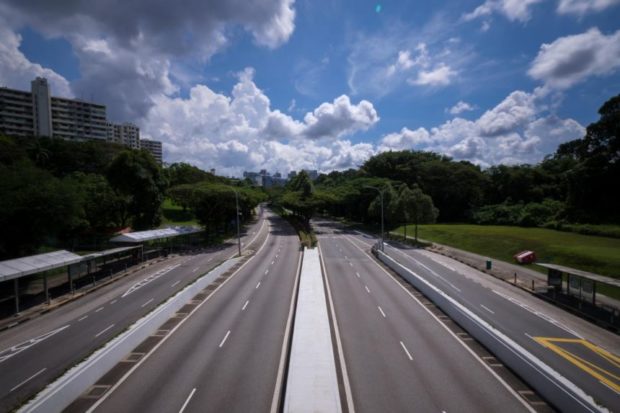Did global COVID-19 lockdowns heal the planet?

Experts said the drop in carbon emissions was largely caused by falls in aviation and land travel. The Straits Times/Asia News Network/GAVIN FOO
SINGAPORE — To escape the scourge of a contagious, microscopic foe, various nations went into lockdown earlier this year.
As people were confined to their homes, cars stowed away and industrial activities slowed, it was as though an invisible broom had swept away the pall of smog, soot and harmful pollutants, to reveal clear skies.
Singapore saw improvements in its air quality before and during the two-month circuit breaker, as key pollutants plummeted to levels within the World Health Organization’s air quality guidelines, some of which the country previously could not meet.
In April, for the first time in decades, people in Punjab could view the Himalayan mountain range about 200km away as India enforced a nationwide lockdown.
The good news was that carbon dioxide emissions fell by a record 7 percent this year, the Global Carbon Project, an international group of researchers who track emissions, found.
But the dip in emissions will account for a negligible 0.01 deg C reduction in global warming by 2050, said the United Nations Environment Program’s (UNEP) latest Emissions Gap Report released early this month.
The world is still on a dangerous trajectory of a more than 3 deg C rise in temperature by the end of the century, failing to meet the Paris Agreement’s goals of limiting global warming to below 2 deg C.
As lockdowns started to ease by mid-2020, many countries returned to fossil fuel-based activities to revive their economies.
The Group of 20 (G-20) nations, which contributes about 78 percent of global emissions, are spending 50 percent more in their Covid-19 stimulus packages on sectors linked to fossil fuels than on low-carbon energy, said the United Nations Secretary-General Antonio Guterres at the Climate Ambition Summit this month.
The G-20 comprises 19 large advanced and emerging economies such as China, India and the United States, and the European Union.
Experts said the drop in carbon emissions was largely caused by falls in aviation and land travel, but transport is not the largest greenhouse gas emitter. Globally, most emissions come from power generation, and industrial activities.
A permanent reduction in emissions can only be achieved by shifting away from the dependence on fossil fuels.
The UNEP report said the Covid-19 global economic downturn provided an opportunity for nations to incorporate decarbonization efforts in their economic recoveries. But few countries have seized the moment.
Such a “green recovery” could shave up to 25 percent off 2030 emissions, the report projected.
“Environmental and social benefit should be an inherent goal of any stimulus, rather than treating sustainability as a ‘luxury good’,” said the Singapore Institute of International Affairs’ assistant director of sustainability, Ms Meixi Gan.
Experts said Singapore is on the right track as it revives its economy.
Under the country’s Emerging Stronger Taskforce, sustainability is the focus of one of seven industry-led coalitions. Singapore wants to become a carbon services hub in Asia to allow for the exchange of carbon credits, create jobs, and enhance the Republic’s role in commodities trading.
The country is also aiming to phase out vehicles with internal combustion engines by 2040.
Despite the UNEP’s recommendations, countries gravely crippled by Covid-19 will likely choose to stick with the status quo rather than introduce unfamiliar alternatives, noted weather and climate scientist Koh Tieh Yong from the Singapore University of Social Sciences.
Citing India, the fourth-largest greenhouse gas emitter, he said: “India has wind farms. But why is it still using coal? Many are struggling with poverty, and the country chose (economic) options that will yield results quickly.
“From the environmental point of view, it looks like a missed opportunity when they don’t apportion the majority of their stimulus package on green energies. But the reality is they can’t do that because they need the economic returns quickly to avoid a graver problem.”
Still, the onus remains on the major emitters – China, India, the EU and the US – to do more to cut emissions.
Singapore Management University climate scientist Winston Chow said: “Even if Singapore decarbonizes mostly by 2030, it will still be a drop in the ocean, in terms of meeting the Paris Agreement goals.”
Singapore contributes around 0.11 percent of global emissions.
In September, China – the world’s largest carbon emitter – promised to be carbon neutral before 2060, an ambition that UNEP welcomed, along with mid-century net-zero emission goals by others including the EU, Japan and South Africa.
“If China is able to succeed in its 2060 goal, global temperatures will increase by only 2.1 deg C by the end of the century,” said Prof Chow.
Apart from cleaner air, the reprieve offered by the reduction of human activities seemed for a moment to be enjoyed by wildlife as well. Images abounded of, among many examples, otters frolicking outside Mustafa Centre and wild goats roaming the streets of a Welsh town.
But the urban areas the animals strayed into may have been wilderness not that long ago, highlighting the extent of the human footprint, said Nanyang Technological University botanist Shawn Lum.
Beyond the instagrammable pictures, the pandemic-biodiversity link is bleak.
The degradation of nature can increase the risk of future pandemics as wildlife-human contact may cause the spillover of new diseases, a recent report by The Intergovernmental Science-Policy Platform on Biodiversity and Ecosystem Services said.
For more news about the novel coronavirus click here.
What you need to know about Coronavirus.
For more information on COVID-19, call the DOH Hotline: (02) 86517800 local 1149/1150.
The Inquirer Foundation supports our healthcare frontliners and is still accepting cash donations to be deposited at Banco de Oro (BDO) current account #007960018860 or donate through PayMaya using this link.